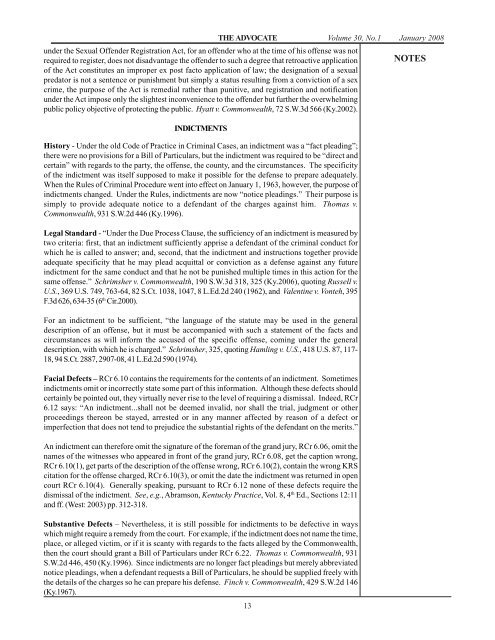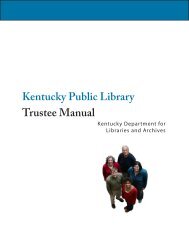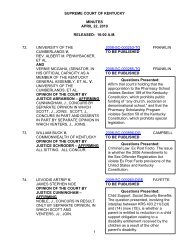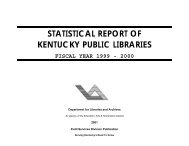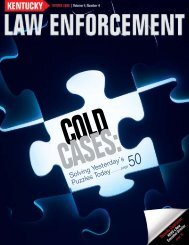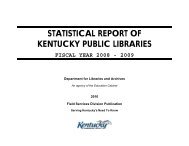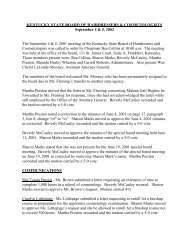Jan08 Advo.pmd - e-archives Home
Jan08 Advo.pmd - e-archives Home
Jan08 Advo.pmd - e-archives Home
Create successful ePaper yourself
Turn your PDF publications into a flip-book with our unique Google optimized e-Paper software.
THE ADVOCATE Volume 30, No.1 January 2008<br />
under the Sexual Offender Registration Act, for an offender who at the time of his offense was not<br />
required to register, does not disadvantage the offender to such a degree that retroactive application<br />
of the Act constitutes an improper ex post facto application of law; the designation of a sexual<br />
predator is not a sentence or punishment but simply a status resulting from a conviction of a sex<br />
crime, the purpose of the Act is remedial rather than punitive, and registration and notification<br />
under the Act impose only the slightest inconvenience to the offender but further the overwhelming<br />
public policy objective of protecting the public. Hyatt v. Commonwealth, 72 S.W.3d 566 (Ky.2002).<br />
INDICTMENTS<br />
History - Under the old Code of Practice in Criminal Cases, an indictment was a “fact pleading”;<br />
there were no provisions for a Bill of Particulars, but the indictment was required to be “direct and<br />
certain” with regards to the party, the offense, the county, and the circumstances. The specificity<br />
of the indictment was itself supposed to make it possible for the defense to prepare adequately.<br />
When the Rules of Criminal Procedure went into effect on January 1, 1963, however, the purpose of<br />
indictments changed. Under the Rules, indictments are now “notice pleadings.” Their purpose is<br />
simply to provide adequate notice to a defendant of the charges against him. Thomas v.<br />
Commonwealth, 931 S.W.2d 446 (Ky.1996).<br />
Legal Standard - “Under the Due Process Clause, the sufficiency of an indictment is measured by<br />
two criteria: first, that an indictment sufficiently apprise a defendant of the criminal conduct for<br />
which he is called to answer; and, second, that the indictment and instructions together provide<br />
adequate specificity that he may plead acquittal or conviction as a defense against any future<br />
indictment for the same conduct and that he not be punished multiple times in this action for the<br />
same offense.” Schrimsher v. Commonwealth, 190 S.W.3d 318, 325 (Ky.2006), quoting Russell v.<br />
U.S., 369 U.S. 749, 763-64, 82 S.Ct. 1038, 1047, 8 L.Ed.2d 240 (1962), and Valentine v. Vonteh, 395<br />
F.3d 626, 634-35 (6 th Cir.2000).<br />
For an indictment to be sufficient, “the language of the statute may be used in the general<br />
description of an offense, but it must be accompanied with such a statement of the facts and<br />
circumstances as will inform the accused of the specific offense, coming under the general<br />
description, with which he is charged.” Schrimsher, 325, quoting Hamling v. U.S., 418 U.S. 87, 117-<br />
18, 94 S.Ct. 2887, 2907-08, 41 L.Ed.2d 590 (1974).<br />
Facial Defects – RCr 6.10 contains the requirements for the contents of an indictment. Sometimes<br />
indictments omit or incorrectly state some part of this information. Although these defects should<br />
certainly be pointed out, they virtually never rise to the level of requiring a dismissal. Indeed, RCr<br />
6.12 says: “An indictment...shall not be deemed invalid, nor shall the trial, judgment or other<br />
proceedings thereon be stayed, arrested or in any manner affected by reason of a defect or<br />
imperfection that does not tend to prejudice the substantial rights of the defendant on the merits.”<br />
An indictment can therefore omit the signature of the foreman of the grand jury, RCr 6.06, omit the<br />
names of the witnesses who appeared in front of the grand jury, RCr 6.08, get the caption wrong,<br />
RCr 6.10(1), get parts of the description of the offense wrong, RCr 6.10(2), contain the wrong KRS<br />
citation for the offense charged, RCr 6.10(3), or omit the date the indictment was returned in open<br />
court RCr 6.10(4). Generally speaking, pursuant to RCr 6.12 none of these defects require the<br />
dismissal of the indictment. See, e.g., Abramson, Kentucky Practice, Vol. 8, 4 th Ed., Sections 12:11<br />
and ff. (West: 2003) pp. 312-318.<br />
Substantive Defects – Nevertheless, it is still possible for indictments to be defective in ways<br />
which might require a remedy from the court. For example, if the indictment does not name the time,<br />
place, or alleged victim, or if it is scanty with regards to the facts alleged by the Commonwealth,<br />
then the court should grant a Bill of Particulars under RCr 6.22. Thomas v. Commonwealth, 931<br />
S.W.2d 446, 450 (Ky.1996). Since indictments are no longer fact pleadings but merely abbreviated<br />
notice pleadings, when a defendant requests a Bill of Particulars, he should be supplied freely with<br />
the details of the charges so he can prepare his defense. Finch v. Commonwealth, 429 S.W.2d 146<br />
(Ky.1967).<br />
13<br />
NOTES


